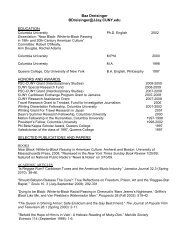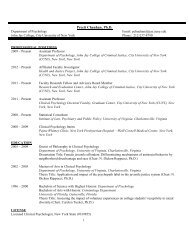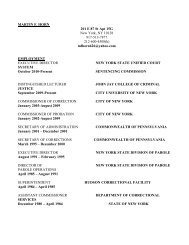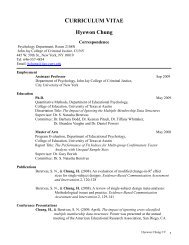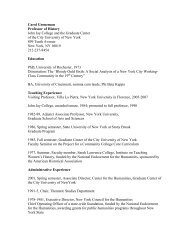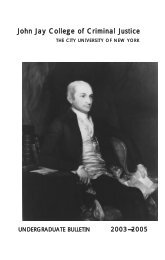Bulletin - John Jay College Of Criminal Justice - CUNY
Bulletin - John Jay College Of Criminal Justice - CUNY
Bulletin - John Jay College Of Criminal Justice - CUNY
Create successful ePaper yourself
Turn your PDF publications into a flip-book with our unique Google optimized e-Paper software.
APPENDIX<br />
assistance of the campus ombudsman or other appropriate person<br />
to facilitate informal resolution.<br />
D. If resolution is not possible, and the Fact Finder concludes that<br />
the facts alleged by the student, taken as true and viewed in the<br />
light most favorable to the student, establish that the conduct<br />
complained of is clearly protected by academic freedom, he or she<br />
shall issue a written report dismissing the complaint and setting<br />
forth the reasons for dismissal and send a copy to the complaining<br />
student, the faculty member, the chief academic officer and the<br />
chief student affairs officer. Otherwise, the Fact Finder shall<br />
conduct an investigation. The Fact Finder shall separately<br />
interview the complaining student, the faculty member and other<br />
persons with relevant knowledge and information and shall also<br />
consult with the chief student affairs officer and, if appropriate, the<br />
college ombudsman. The Fact Finder shall not reveal the identity<br />
of the complaining student and the faculty member to others except<br />
to the extent necessary to conduct the investigation. If the Fact<br />
Finder believes it would be helpful, he or she may meet again with<br />
the student and faculty member after completing the investigation<br />
in an effort to resolve the matter. The complaining student and the<br />
faculty member shall have the right to have a representative<br />
(including a union representative, student government<br />
representative or attorney) present during the initial meeting, the<br />
interview and any post-investigation meeting.<br />
E. At the end of the investigation, the Fact Finder shall issue a<br />
written report setting forth his or her findings and<br />
recommendations, with particular focus on whether the conduct in<br />
question is protected by academic freedom, and send a copy to the<br />
complaining student, the faculty member, the chief academic<br />
officer and the chief student affairs officer. In ordinary cases, it is<br />
expected that the investigation and written report should be<br />
completed within 30 calendar days of the date the complaint was<br />
filed.<br />
V. Appeals Procedure. If either the student or the faculty member is not<br />
satisfied with the report of the Fact Finder, the student or faculty member<br />
may file a written appeal to the chief academic officer within 10 calendar<br />
days of receiving the report. The chief academic officer shall convene and<br />
serve as the chairperson of an Appeals Committee, which shall also<br />
include the chief student affairs officer, two faculty members elected<br />
annually by the faculty council or senate and one student elected annually<br />
by the student senate. The Appeals Committee shall review the findings<br />
and recommendations of the report, with particular focus on whether the<br />
conduct in question is protected by academic freedom. The Appeals<br />
Committee shall not conduct a new factual investigation or overturn any<br />
factual findings contained in the report unless they are clearly erroneous.<br />
If the Appeals Committee decides to reverse the Fact Finder in a case<br />
where there has not been an investigation because the Fact Finder<br />
erroneously found that the alleged conduct was protected by academic<br />
freedom, it may remand to the Fact Finder for further proceedings. The<br />
committee shall issue a written decision within 20 calendar days of<br />
receiving the appeal. A copy of the decision shall be sent to the student,<br />
the faculty member, the department chairperson and the president.<br />
VI. Subsequent Action. Following the completion of these procedures,<br />
the appropriate college official shall decide the appropriate action, if any,<br />
to take. For example, the department chairperson may decide to place a<br />
report in the faculty member's personnel file or the president may bring<br />
disciplinary charges against the faculty member. Disciplinary charges<br />
may also be brought in extremely serious cases even though the college<br />
has not completed the entire investigative process described above; in that<br />
case, the bringing of disciplinary charges shall automatically suspend that<br />
process. Any action taken by a college must comply with the bylaws of<br />
the University and the collective bargaining agreement between the<br />
University and the Professional Staff Congress.<br />
VII. Campus Implementation. Each campus shall implement these<br />
procedures and shall distribute them widely to administrators, faculty<br />
members and students and post them on the college website.<br />
VIII. Board Review. During the spring 2009 semester, the Chancellery<br />
shall conduct a review of the experience of the colleges with these<br />
procedures, including consultation with administrators, faculty and<br />
students, and shall report the results of that review to the Board of<br />
Trustees, along with any recommended changes.<br />
SECTION 504 OF THE REHABILITATION ACT OF<br />
1973 AND THE AMERICANS WITH DISABILITIES<br />
ACT OF 1990<br />
In accordance with Section 504 of the Rehabilitation Act of 1973,<br />
“The Civil Rights Act” for the people with disabilities and the<br />
Americans with Disabilities Act of 1990, the <strong>College</strong> adheres to the<br />
law that states in part that: “No otherwise qualified individual ...<br />
299



